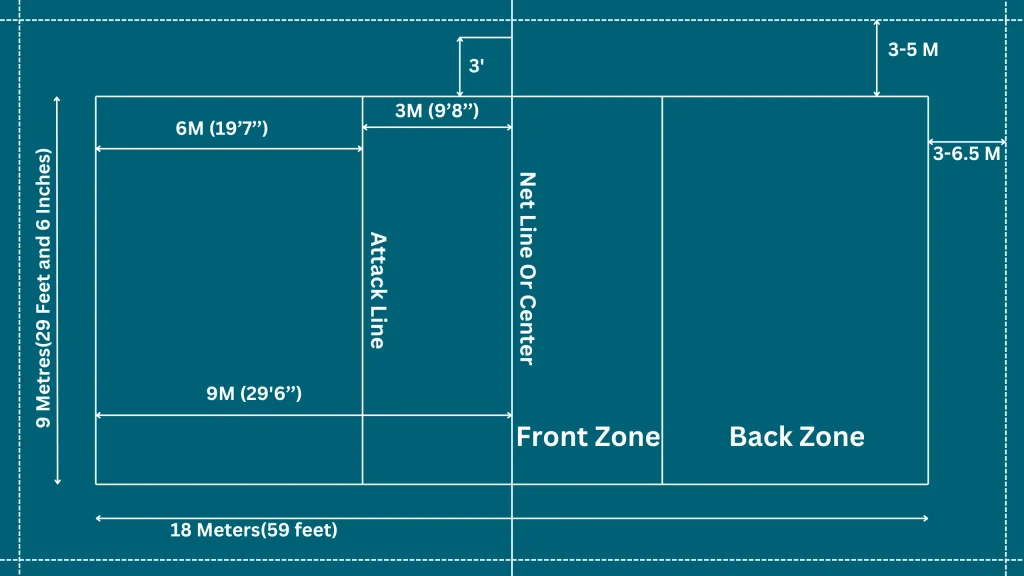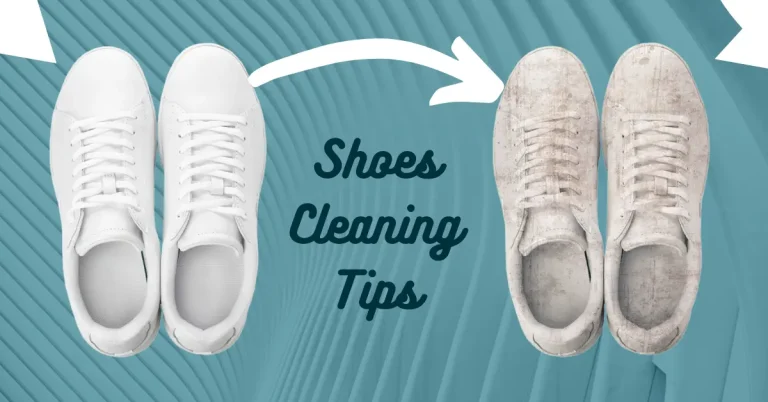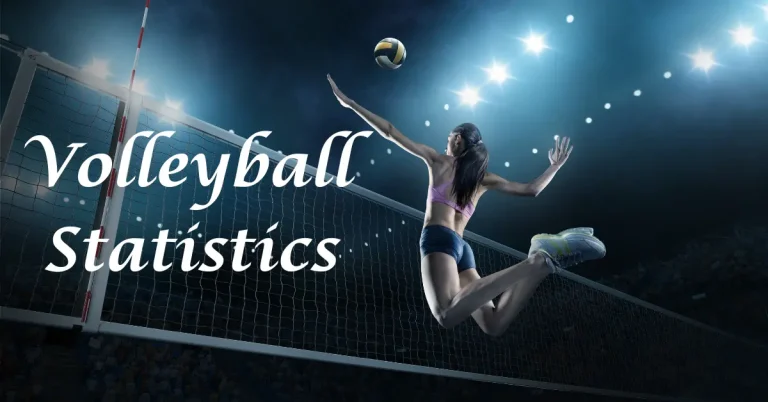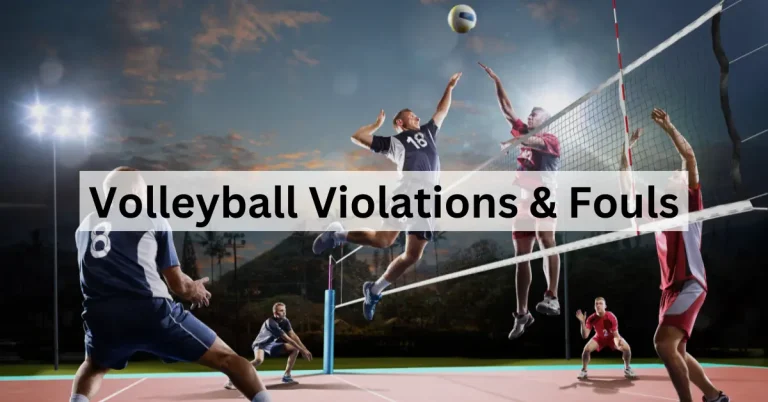A Complete Guide to Essential Volleyball Equipment For Every Player
Do you plan to play volleyball? Or are you a new volleyball player? Or do you want to know about the basic equipment used during the volleyball game? Don’t worry; in this article, I’m going to tell you what equipment you need before playing this game, and I will also tell you the purpose of this equipment.
List Of Indoor Volleyball Equipment:
| Volleyball Ball | Check Price |
| Court | |
| Net | Check Price |
| Antennas | Check Price |
| Poles | |
| Uniform | Check Price For Shirts Check Price For Shorts |
| Arm Sleeves | Check Price |
| Bag Or Backpacks | Check Price |
| Shoes | Check Price |
| Knee Pads | Check Price |
| Ankle Braces | Check Price |
| Elbow Pads | Check Price |
| Ball Cart | Check Price |
| Finger Tape | Check Price |
| Floor Tape | Check Price |
| Water Bottle | Check Price |
List Of Outdoor Volleyball Equipment:
| Sand Court | |
| Beach Volleyballs | Check Price |
| Portable Net | Check Price |
| Antenna | Check Price |
| Poles | |
| Boundary Lines | Check Price |
| Anchor Kits | Check Price |
| Umbrella Or Sun Shelter | Check Price |
| Sunglasses and Hats | Check Price |
| Sunscreen | Check Price |
| Water Bottle | Check Price |
| Shoe | Check Price |
| Uniform | Check Price For Shirts Check Price For Shorts |
| Arm Sleeves | Check Price |
| Knee Pads | Check Price |
| Ankle Braces | Check Price |
| Elbow Pads | Check Price |
| Finger Tape | Check Price |
| Towel | Check Price |
| Backpack | Check Price |
List Of Equipment For Coach :
| Whistle | Check Price |
| Stopwatch | Check Price |
| Volleyball Cones | Check Price |
| Volleyball Cart | Check Price |
| Clipboard | Check Price |
| Training Aids | Check Price |
List Of Equipment For Referee:
| Referee Stand | Check Price |
| Coin Toss Equipment | Check Price |
| Pump And Pressure Gauge | Check Price |
| Volleyball Cards | Check Price |
| Scorecards | Check Price |
| Timer | Check Price |
| Whistle | Check Price |
| Paper And Pen | Check Price |
| Rulebook | Check Price |
Why To Use Basic Volleyball Equipment?
Basic volleyball gear is essential for every player because not using these tools can affect your game experience. Some equipment that is most important to use is shoes because volleyball is a game of jumping. Without shoes, it is impossible to jump well. In volleyball rules, there is also some info about equipment like court size, net height, ball size, or ball pressure. Using the proper equipment reflects a sense of professionalism, and it shows respect for the sport.
Indoor Volleyball Accessories:
Volleyball Court:
One of the essential things in volleyball is the court because if there is no court, then what will you play? The court dimensions are the same for both men and women and are given by FIVB. The volleyball is 9 meters long in width and 18 meters long and is divided equally into two parts.

Poles:
Net is attached to poles, so they are necessary. These poles are further securely anchored to the floor. The height of the net is easily accessible through the poles and standards.
Volleyball Ball:
The most important thing in the whole volleyball gameplay is the ball. Suppose there is no ball, then with what thing will you play? So a volleyball ball is necessary. The volleyball size in diameter is 8.15”-8.39” (20.7-21.3 cm) with a weight between 9-10 oz (260-280 g), and pressure inside the volleyball is around 4.26-4.61psi (29.4-31.8 kPa). Indoor volleyball is typically made of leather or synthetic leather-type material, which is molded together. These indoor balls provide a smooth and consistent surface and are designed for precise and controlled movements for indoor volleyball.
Volleyball Net:
The volleyball court is divided into two halves, and the thing that divides it is the net. It is placed in the center of the court. The net is around 34-40 feet long, and its height is different for men and women. According to FIVB, the net’s height for men is 7 feet 11 5/8 inches, and for women, it’s 7 feet 4 1/4 inches.
Ankle Braces:
One of the most important and common accessories that every player needs or uses is ankle braces. Ankle braces are not necessary to wear, but wearing them is not an issue. The main purpose of an ankle brace is to provide feet with a feel of stability and help ankle joints for compression. Ankle braces are mandatory to prevent ankle injuries, which are very common.
Antennas:
Antennas are vertical rods that are used in the net to make the games easy and reliable for everyone. These rods are very necessary as they help to make a decision. If the ball is passed between these antennas, then it’s not a fault, but if it passes outside it or touches it, it’s a fault. So, antennas on the net help to make the game clean and professional for everyone.
Arm Sleeves:
Arm sleeves are mostly used in outdoor volleyball but are also utilized in indoor volleyball. The purpose of arm sleeves is to prevent direct sunlight exposure on the arms and to provide protection from burning when the arms come into contact with the ground.
Backpack:
In volleyball, players also need a backpack, and these bags can be used for various reasons. Bags provide the player with ease of storing the gear in an organized way, and they are easy to carry. Soccer Bags, Basketball Bags and Volleyball are the same because many things are similar. These bags provide you with good storage of balls, bottles, uniforms, shoes, pads, and other personal items.
Knee Pads:
Similar to ankle braces, knee pads are crucial for safety and serve as a preventive measure against injuries to the knees. Wearing these pads is technically important, especially for newcomers, as they may struggle to control their movements initially. Knee pads provide players with a safety shield, preventing skin burns when sliding during play.
Elbow Pads:
When it comes to elbow pads, they are not considered mandatory compared to ankle braces and knee pads. Wearing elbow pads is not only good but also preferable. These pads protect your arms from various types of injuries and provide additional support. Wearing them helps to alleviate the tension of potential injuries.
Finger Tape:
Volleyball is a sport that involves a significant amount of ball contact and powerful spikes. Players use finger tape to secure their fingers, especially their thumbs. These tapes play an important role in ensuring the safety of finger joints, particularly considering that the ball can travel at speeds exceeding 50 miles per hour. Keep in mind that it’s a personal choice, but safety is essential.
Floor Tape:
Floor Tape is used for many purposes, but the main one in volleyball is that it helps to create boundary (ending) lines. Most coaches use this tape for the practice session. This tape is applied on the floor for marking the playing area, including baselines, centreline, or attacking.
Volleyball Shoes:
Wearing volleyball in indoor games is compulsory because this provides various benefits to its users. The first purpose of wearing volleyball shoes is to provide traction and stability because the player has to stop and go suddenly. The second importance is to provide player ease of jump due to shock absorption, and the third one, which is most important, is the girp that firmly grips your foot firmly to the place you want.
Uniform:
Volleyball uniform usually contains a shirt and shorts, which are very easy to wear and players feel comfortable. The volleyball shirt comes in different colors and sizes, and also, shorts come in various colors and sizes.
Outdoor Volleyball Accessories:
Most gear of both indoor and outdoor volleyball is the same, but the differences are a few ones that I have described below:
Sand Court:
Outdoor volleyball is typically played on sandy surfaces. The court surface and dimensions are different from indoor volleyball. The sand volleyball court dimensions, according to FIVB, are:
Sand Volleyballs:
Outdoor volleyballs are different from indoor volleyballs. The main difference is that they are stitched, while indoor volleyball is molded. The second difference is that they are lighter than indoor volleyballs. The Outdoor volleyball is made of water-resistant material.
Portable Volleyball Net:
In outdoor volleyball, the net system is portable, so you can easily carry it and transport it. These nets are typically designed for outdoor volleyball and also come with different widths, but the heights are the same. The dimensions of the outdoor volleyball net are:Sunscreen:
Sunscreen is a very important product that every player needs before gameplay. These usually come in cream, lotion, gel, or spray. This product enables the player to protect their skin from direct sunlight.
Sunglasses and Hats:
Sunglasses and hats are other important items for the safety of players. They help to block the sunlight that enters the face and eyes directly.
Water Bottle:
Water bottles are very essential for both outdoor and indoor volleyball players. Drinking water during gameplay is essential because it keeps players hydrated and restores their energy levels. So there is a big responsibility on the coach to tell them that every player should come with their water bottles.
Boundary Lines:
In indoor volleyball, ending lines are usually created by floor tape or tape, but for outdoor volleyball on sandy floors, rope-like material are used to make boundary lines that indicate the court area.
Anchor Kits:
The wind is usually fast outside, and on beaches, the wind is too fast, so you need anchor kits to place the net and marking lines firmly. These anchor helps to prevent moving these nets.
Umbrella Or Sun Shelter:
These products provide shadow and shade for every outdoor player.
Accessories Of Coach:
Training Aids:
Training aids are gear that includes spike trainers, blocking pads, setting target net and other tools related to it. For beginners, training aids are very important because these help them to enhance their game performance and optimize it. These aids are designed to improve specific aspects of an athlete’s skills, technique, strength, or overall performance.
Stopwatch Or Timer:
Both coaches and referees use the timer and stopwatch. Coaches use practice sessions that help in timing drills and measuring players’ performance. Referees use this timer that helps them to manage time between plays, timeouts and other game-relevant events.
Volleyball Cart:
A volleyball cart is used to store the balls in an organized way. Coaches often use this gear during practice. With a cart, a coach can easily distribute balls during gameplay.
Volleyball Cones:
Cones are essential gear that every coach needs, and they are used for setting up training drills, marking specific areas, or organizing players on the court during practice.
Clipboard:
Coaches in volleyball games usually use the clipboard, which provides them an ease of keeping records and organizing game plans, strategies, and notes during a match.
Accessories Of Referee:
Penalty Cards:
In volleyball, two penalty cards are used: one yellow and the other red. The purpose of these cards is to ensure fair gameplay. The yellow card serves as a formal warning and does not expel the player. However, the red card penalty is a serious warning that a referee can issue for aggressive behavior, misconduct, or any action that disrespects the game. The red card penalty can lead to the expulsion of the player.
Rotation Locator:
In volleyball, a rotation locator is used by both the referee and the coach, and it helps to keep track of the rotational order of players on the court. The main purpose of this gear is to make the game easy and fair, and this ensures that players are in the correct serving and receiving positions according to the rules of the game.
Toss Equipment:
The coin is usually used for tossing between two teams, and this indicates which teams serve first and start the game.
Rule Books:
Mostly, the referee uses and carries copies of official volleyball rules books. This helps them for quick reference and enables fair gameplay.
Paper and Pen:
During gameplay, the referee is fully focused on the game and notices everything. Paper and pen enable us to keep track of substitutions, warnings, and other match-related information.
Pump And Pressure Guage:
These gear are used to ensure that volleyball is according to the FIVB rules and regulations by measuring its pressure. The average pressure is about 4.26-4.61 psi (29.4-31.8 kPa).
ScoreCard:
Keeping records of points and sets during gameplay is important so that no one can cheat. A scorecard or Scoreboard also helps the viewer to remember the points and sets easily. These cards show live scores and other relevant information.
FAQs:
Conclusion:
Summing up, having the right volleyball equipment is crucial for every player, coach, and referee. From essential gear like balls, nets, and shoes to accessories like knee pads, ankle braces, and training aids, each item plays a vital role in enhancing the game experience and performance and ensuring safety. Whether playing indoors or outdoors, using proper equipment indicates professionalism and reflects respect for the game.


















